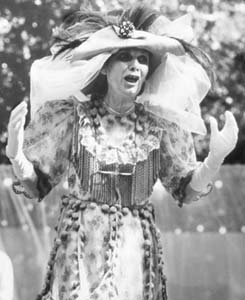(Mis)Fitting In
Michael Amsler
'Every Little Thing' screens at SFI
By David Templeton
IN 1953, while still a young psychiatrist, and before he had won the renown of his peers and colleagues around the world, Jean Oury founded a small, innovative asylum for the mentally ill. The La Borde Clinic, near the town of Cour-Cheverny in the Loire Valley of France, was established with the goal of becoming everything the word asylum once meant: a shelter, a place of refuge, a sanctuary. Still in operation today, La Borde has been a defining model in the field of institutional psychotherapy.
Among the many distinctions that make La Borde so special is the annual summer tradition in which the "boarders" and staff work together to perform a play, choosing from among the world's greatest classical works.
When noted French documentarian Nicholas Philibert (Louvre City, Animals, In the Land of the Deaf) chose this peculiarly magical event as the focus of his next film, he was aware of the dangers that lay ahead. Such explorations of the world of the insane have a tendency to drift toward either becoming some frightening and freakish spectacle or being burdened with an overly condescending sentimentality in which the mentally ill are fussed over like sweet, misunderstood babies.
That Philibert's luminous 1997 movie Every Little Thing--screening this weekend at the Sonoma Film Institute--manages to avoid these traps is a remarkable feat in itself. In vaulting over these obstacles with effortless grace and clear-eyed humanity, he simply refuses to treat his "actors" as lost souls deserving of pity. Instead, Philibert calmly and compassionately builds an experience that is less like watching a documentary than like being enveloped in a book of breathlessly honest poetry.
As In the Land of the Deaf, in which Philibert abandoned the convention of voice-over narration--since there is no out-of-sight communication for those used to speaking in the silent language of signs and signals--the filmmaker allows the central subject of his film to suggest its own appropriate narrative style. Without interpretation or explanation, the residents of La Borde themselves become the film's narrators, describing in their own distinctive words and often non-linear logic the events of the summer as it unfolds around them.
The play we see being rehearsed is oddly suited to La Borde: the absurdist 1966 masterpiece Operetta, by the great Polish modernist Witold Gombrowicz. With a text that is even less comprehensible than the musings of the clinic's boarders, the enthusiastic verbal shenanigans--complete with bubbly songs and dances--provide a mesmerizing counterpoint to the quieter communications of the cast. "When human affairs can't be crammed into words," goes one of Gombrowicz's choruses, "language explodes."
Later, a character speaks the line, "Flatulence! Heartburn! Statistics and migraines! The law of great numbers!" As explained by a soft-spoken, quietly dignified fellow named Michel--at La Borde since 1969, he's been in every summer play since--"The lines are totally illogical. That comforts me."
More often than not, these scenes have the effect of being several things at once: funny and disturbing, touching and strange, paralleling the chorus of contesting voices that a number of La Borde's residents are accustomed to hearing.
Another of Philibert's little miracles comes as the result of there being no effort made to introduce or label any of the people--the staff and the residents--who appear before the camera. Though some of these persons are obviously ill, the distinctions that separate sane from insane end up blurring; people we assume are patients because they might be speaking in excited, hyped-up tones, for example, are suddenly addressed as "doctor" by one of the others.
Folks we assumed to be therapists are suddenly chiding invisible figures for interrupting their work.
By the film's halfway point, the lines have blurred so that they all but disappear, and the common attributes of each person--determination to do well, fear of failure, unfailing patience with one another--end up dulling the frightening sting of words like insane and mentally ill.
At the film's conclusion, Michel--basking in the French sun and the glow of another successful performance--dreamily explains, "I'm floating. But I'm at La Borde, so I'll be all right. Here we are protected from ourselves, because we are among ourselves."
With a welcoming smile, he adds, "And now, you are among us too."
[ Sonoma County | MetroActive Central | Archives ]
Copyright © Metro Publishing Inc. Maintained by Boulevards New Media.
![]()
 Mind games: Nicholas Philibert's documentary about a theatrical production by patients at a French asylum is a thought-provoking cinematic work.
Mind games: Nicholas Philibert's documentary about a theatrical production by patients at a French asylum is a thought-provoking cinematic work.
Every Little Thing screens Thursday and Friday, April 30 and May 1, at 7:30 p.m. Sonoma Film Institute, Sonoma State University, Darwin Hall, 1801 E. Cotati Ave., Rohnert Park. Admission is $4/general, $3.50/non-SSU students and seniors, and $2.50/SFI members and children under 12. 664-2606.
From the April 23-29, 1998 issue of the Sonoma County Independent.
![[MetroActive Movies]](/gifs/movies468.gif)